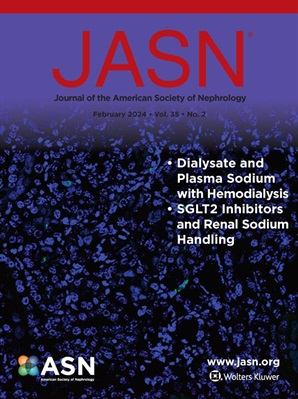Dysregulated Bone Marrow Contributes to Glomerular Injury through Soluble Factors.
IF 9.4
1区 医学
Q1 UROLOGY & NEPHROLOGY
引用次数: 0
Abstract
BACKGROUND Immune dysregulation and chronic inflammation have been implicated in the pathogenesis of CKD. Altered bone marrow hematopoiesis is commonly observed in CKD-associated conditions, such as diabetes, cardiovascular disease, and aging. However, the role of bone marrow dysfunction in CKD progression has not been thoroughly interrogated in humans. This study examines how inflammation-induced bone marrow alterations contribute to CKD progression. METHODS Bone marrow aspirates were obtained from 10 CKD patients (8 with FSGS, 6 of whom were kidney transplant recipients) and from healthy donors. Samples were analyzed using ELISA, multiplex cytokine assays, multicolor flow cytometry, and scRNA sequencing. To mimic CKD patient bone marrow alterations, in vitro myelopoiesis assays were conducted under TNFα exposure. Cellular and molecular changes were assessed via ATAC-seq, RNA-seq, metabolic assays, flow cytometry, and cytokine analysis. We tested the in vivo effect of TNFα blockade and co-injection of TNFα with IFNγ in mice. We also measured TNFα levels in three different mouse models of proteinuria and in suPAR-deficient mice. The impact of secreted factors from TNFα-driven, functionally altered myeloid cells on kidney function was evaluated using high-throughput immunofluorescence assays on cultured podocytes and filtration function assays in zebrafish. RESULTS Bone marrow from CKD patients exhibited elevated TNFα and suPAR levels, along with inflammatory transcriptomic profiles in monocytic cells. TNFα-driven myelopoiesis in vitro induced altered monocytic cells resembling those in CKD patients. These cells displayed increased metabolic activity, transcriptional and epigenetic reprogramming, and elevated secretion of proinflammatory cytokines and suPAR. In a cooperative manner, these secreted factors caused filtration dysfunction in zebrafish and led to cytoskeletal disarrangement in cultured podocytes. In mice, TNFα exposure during myelopoiesis resulted in increased suPAR levels and proteinuria. CONCLUSIONS TNFα-driven alterations in bone marrow monocytic cells contribute to glomerular dysfunction in CKD, suggesting bone marrow dysfunction as a central upstream driver of CKD.骨髓失调通过可溶性因子导致肾小球损伤。
背景免疫失调和慢性炎症与慢性肾病的发病机制有关。骨髓造血功能改变常见于ckd相关疾病,如糖尿病、心血管疾病和衰老。然而,在人类中,骨髓功能障碍在CKD进展中的作用尚未得到彻底的研究。本研究探讨炎症诱导的骨髓改变如何促进CKD进展。方法取10例CKD患者(8例为FSGS, 6例为肾移植受者)和健康供者的骨髓。使用ELISA、多重细胞因子测定、多色流式细胞术和scRNA测序对样品进行分析。为了模拟CKD患者的骨髓改变,在TNFα暴露下进行了体外骨髓生成实验。通过ATAC-seq、RNA-seq、代谢测定、流式细胞术和细胞因子分析评估细胞和分子变化。我们在小鼠体内测试了TNFα阻断和TNFα与IFNγ共注射的作用。我们还测量了三种不同的蛋白尿小鼠模型和supar缺陷小鼠的tnf - α水平。利用培养足细胞的高通量免疫荧光法和斑马鱼滤过功能测定法,评估tnf α驱动、功能改变的髓细胞分泌因子对肾功能的影响。结果CKD患者骨髓中TNFα和suPAR水平升高,单核细胞中炎症转录组谱升高。tnf α驱动的体外骨髓生成诱导与CKD患者相似的单核细胞改变。这些细胞表现出代谢活性增加,转录和表观遗传重编程增加,促炎细胞因子和suPAR分泌增加。这些分泌因子协同作用,导致斑马鱼滤过功能障碍,并导致培养足细胞的细胞骨架紊乱。在小鼠中,骨髓形成期间TNFα暴露导致suPAR水平升高和蛋白尿。结论stnf α驱动的骨髓单核细胞改变参与CKD肾小球功能障碍,提示骨髓功能障碍是CKD的核心上游驱动因素。
本文章由计算机程序翻译,如有差异,请以英文原文为准。
求助全文
约1分钟内获得全文
求助全文
来源期刊
CiteScore
22.40
自引率
2.90%
发文量
492
审稿时长
3-8 weeks
期刊介绍:
The Journal of the American Society of Nephrology (JASN) stands as the preeminent kidney journal globally, offering an exceptional synthesis of cutting-edge basic research, clinical epidemiology, meta-analysis, and relevant editorial content. Representing a comprehensive resource, JASN encompasses clinical research, editorials distilling key findings, perspectives, and timely reviews.
Editorials are skillfully crafted to elucidate the essential insights of the parent article, while JASN actively encourages the submission of Letters to the Editor discussing recently published articles. The reviews featured in JASN are consistently erudite and comprehensive, providing thorough coverage of respective fields. Since its inception in July 1990, JASN has been a monthly publication.
JASN publishes original research reports and editorial content across a spectrum of basic and clinical science relevant to the broad discipline of nephrology. Topics covered include renal cell biology, developmental biology of the kidney, genetics of kidney disease, cell and transport physiology, hemodynamics and vascular regulation, mechanisms of blood pressure regulation, renal immunology, kidney pathology, pathophysiology of kidney diseases, nephrolithiasis, clinical nephrology (including dialysis and transplantation), and hypertension. Furthermore, articles addressing healthcare policy and care delivery issues relevant to nephrology are warmly welcomed.

 求助内容:
求助内容: 应助结果提醒方式:
应助结果提醒方式:


